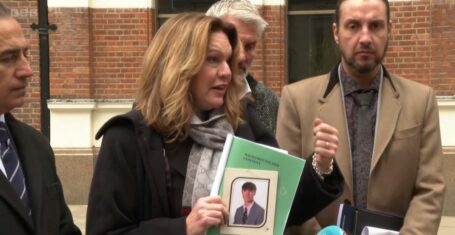
What my experience as a mixed-race person at university has been like
Am I brown enough to call myself half Asian?
University has opened me up to a more diverse community, but this has not made ignorance about my heritage from others disappear.
Despite being mixed-race, I benefit from colourism, the preferential treatment of lighter-skinned people, because I am what is known as ‘white-passing’. Due to this, I have not experienced profound racism at university but I have, however, experienced peoples’ profound ignorance and I am fed up of the mindless and uneducated remarks.
During Fresher’s week, despite having been born and raised in the UK, I was asked constantly where I was from – no, seriously. I also got it on dating apps; when I used Tinder or Bumble, a lot of my matches would guess my ethnicity as a conversation starter.
I grew tired of explaining that I am half South Asian and of people mispronouncing my surname for fun.

Kalli’s parents, who are of different ethnicity, on their wedding day.
I love telling people about my identity, but only when they are genuinely interested in me, and not to use me as a fetish. By fetish, I mean when people respond “omg, you are so interesting!” when I tell them that my father is Sri Lanken. No, I am not interesting because of my heritage, I want to be considered interesting because of me – who I am personally.
I want to point out that these kinds of passing comments that have been made that have longterm effects on the identity of mixed-race individuals like myself.
Someone on my course once told me that she was really surprised to see that my dad is dark skinned and south Asian. In her defence, I am white-passing. However, her comment highlights the lack of awareness surrounding the diversity of mixed-race individuals. Too many people have a set image of what a mixed-race individual looks like.

Kalli on campus
This image, which people use as a goalpost, causes identity issues. In my own experience, a few peers have said that I am “too pale to be mixed-race” which made me believe that the colour of my skin determined whether I can qualify to call myself mixed-race or not.
You can be mixed-race and dark, and you can be mixed-race and light. We come in a multitude of colours, hair textures, and languages – the mixed-race diaspora is vast and there is no one definition of mixed-race.
Due to these kinds of insensitive and ignorant remarks, I feel almost as if I lie when I tick the box for “mixed White and Asian”. Am I brown enough to call myself half Asian? I hardly know anything about Sri Lanka meaning that when I do speak about my Asian heritage, I feel guilty of only tapping into my ‘brown-ness’ when it is convenient.
I know that I am not ‘100% brown’ but that does not make my Sri Lankan heritage any less valid. Pushing an identity onto mixed-race people, rather than allowing the individual to identify how they prefer, is problematic.

UoN Sri Lanken society
On a more positive note, being at university has opened me up to more of a diverse community than I have ever experienced before. Coming from a majority white area, in which I was one of a handful of BAME individuals, to a university that has a dedicated BAME network, as well as societies such as the Sri Lankan Soc, makes me feel more comfortable in my skin and I can meet more fellow Sri Lankans and BAME students. However, despite these positives the ignorant comments continue, even at university.
Related articles recommended by this author:
• It’s NOT just a joke – black students are exhausted by blackface and gaslighting
• A list of Anti-Racist resources you can read on NUSearch right now
• ‘I’ve seen it all, I’ve heard it all’: Notts students speak out about their experiences of racism









































